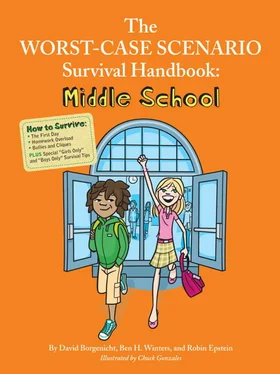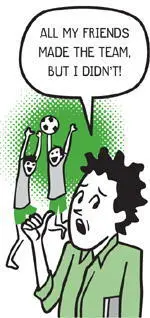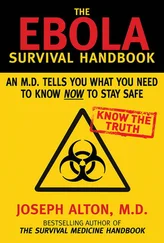
How to Try Out Without Freaking Out
After-school activities are great for making friends, blowing off steam, and showing off skills (and putting off homework!). But making the team or auditioning for the play can be intimidating. Here’s how to send those nerves packing and enjoy the ride.
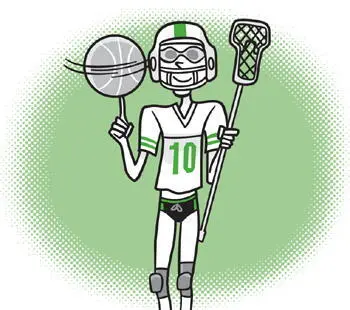
MAKING THE TEAM
• Just as you train your brain for a test, you can give your body a boost before tryouts. Start exercising and practicing now to prepare.
• When the big day arrives, prove that you’ll make a great teammate by cheering for others, too.
NABBING A PART IN THE SCHOOL PLAY
• Before you arrive, look up the show online so you know as much as possible about it. If it’s a musical, find out if you’ll have to sing at the audition. Then be a rock star: Pick a song, memorize it, and practice your heart out!
• As you audition, pretend you’ve already made it. Think of the people in the room as your enthusiastic opening-night audience.
GETTING ON THE CHEERLEADING SQUAD
• Cheerleading is all about attitude. A big smile can be as valuable as a back handspring.
• Ask someone who’s on the squad to teach you a cheer or two so you can walk into the tryout one high kick ahead of the curve.
RUNNING FOR STUDENT OFFICE
• Campaigning is key, so arrive to school early during the week before the election and say “hey” to everyone coming into the building. Think of a memorable slogan, and use that theme in all your campaign materials. For instance, if you say, “Jimmy has the magic!” you could hand out playing cards with your name and campaign plans on them.
• During your speech, you could do a magic trick. Keep hitting that message: You have the power to get things done!
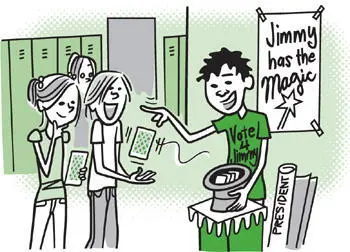
Worst Nightmare
Your buds made the team and now they’re busy doing the one thing you wish you could do. There are ways to make this major bummer better.
• Take note.
What moves did your friends make that got them on the team? Work on those for next year’s tryouts!
• Cheer ’em on.
Instead of feeling left out, “join the team” in other ways. Sit in the front row of the bleachers when your pals are playing, and cheer louder than anyone else. Bonus: Being a good observer of the team’s strategies will reveal helpful tricks you can put to use.
• Try something else.
Maybe you’re not destined to be a star soccer player—what about being your school’s first-ever fencing champion? How ’bout starting a comedy troupe? Ask an administrator how you can start your own group, team, or club—and make your own fun!
How to Survive a Massive Mess-Up
You did it! You did it! You kicked the ball right into the net! Except, uh, that’s the other team’s net, and you just scored a goal for the visitors . Or maybe you tossed a total air ball on your foul shot, or shouted at full volume when all the other cheerleaders were totally silent. Your extracurricular just got extra embarrassing, but it’s nothing you can’t handle.
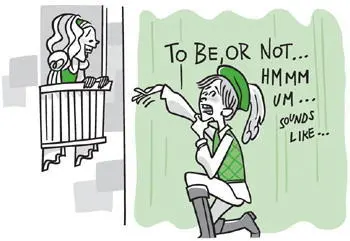
1 Minimize the damage.
If you spaced on your big line in the play, make up something “in character” to say. If your pom-pom flew into the bleachers, keep cheering with the other one.
2 Fake it.
No matter how much you feel like collapsing in tears, keep playing (or cheering, or acting) with a smile. Freaking out will tell the world that this is a big deal. If you stay calm, they may never know.
3 Tease yourself first.
You know the jokes are coming, so get there first with one of these self-directed zingers.
• “Just trying to keep things interesting.”
• “So did everyone see my lesson on what not to do?”
• “Well, let’s not run that play again.”
4 Learn from your mistakes.
Do you need to rehearse more? Practice a particular move? If your next performance is terrific, no one will remember the time you kicked the goalie instead of the ball.
Benched!
You’re on the team, but Coach never plays you. Or you’re in the play, but instead of leading lady, you’re Shrub #4. Here’s how to make the best of it.
• Be helpful:Hand out towels, pour water, or, while you’re waiting to rehearse Shrub #4’s scene, grab a brush and paint scenery. That way, you’re involved and useful.
• Branch out:After practice, work on your handmade-jewelry line or teach yourself to juggle. Once you find other stuff you’re good at, it won’t matter if you’re not so hot on the field.

How to Avoid Extra-Curricular Exhaustion
You joined three teams, four clubs, pep band, and debate. When you’re debating whether to nap in social studies or math class, it’s time to drop out of something . Move the following assignment to the top of today’s list: Get Mom and Dad to give you the okay.
1 Pick the right time to discuss the drop.
This is not a conversation to have right after practice, when you’re worn out, grumpy, and irritated. That only hands Mom and Dad an easy response: “You had a rough day. Try again tomorrow.”
2 Make a list of pros and cons.
Write the list out twice, so each parent can have a copy. Note the benefits of staying involved with the activity to show your folks that you’re not only seeing negatives: You’ve thought it over and made a mature decision.
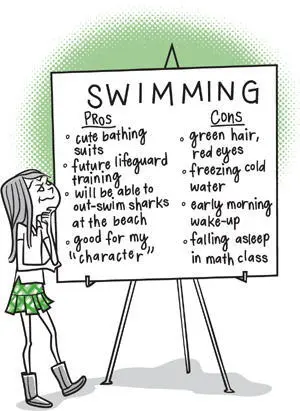
3 Arrive armed with answers.
Anticipate what your parents might say and prepare good responses in advance.
Parents: “You need to give field hockey more of a chance.”
You: “I talked to my coach about that, and she felt that three months was long enough to get a good sense of the sport.”
Parents: “Learning an instrument is important.”
You: “Having enough study time is even more important.”
Do not say:
“I’m so bad at the oboe, it just sounds like I’m farting!”
“Maybe if you got your lazy behind off the couch and practiced with me, I’d be better.”
“But you quit everything you start, Dad!”
CHAPTER 3
The Social Scene

Читать дальше
